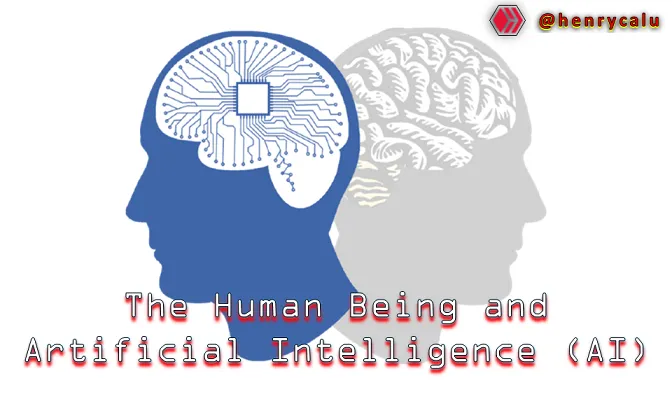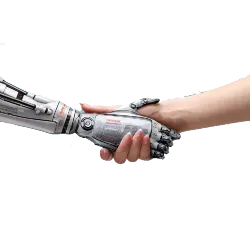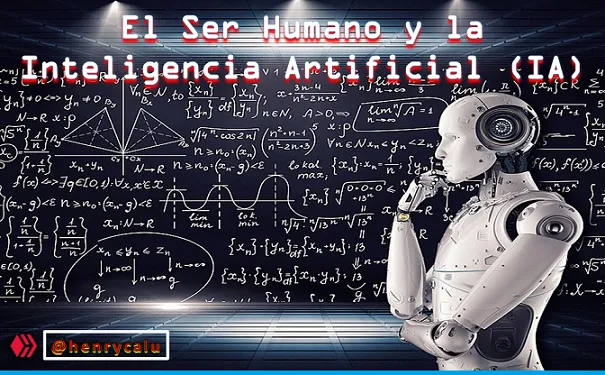The Human Being and Artificial Intelligence (AI)
Our human species, called by scientists as "Homo sapiens" (in Latin), belongs to the order of the Primates, which are family of the Hominids. This denomination means "Wise Man" who has been able to create, organize, dominate and transform the current human civilization throughout the geography of planet Earth. Possessing great bodily features that distinguish it from the rest of the animals: it is a biped animal, it is able to walk upright (by means of lower extremities), due to the fact that it has in its upper extremities several joints with the ability to raise its arms (deltoids), flex (biceps), stretch (triceps); it also has the positioning of the complex and articulated structure that the natural evolution could offer to the human being: the hands. They can be used to manipulate and hold (prehensile capacity).

Counting on other capacities, it has the faculty of thought, which in certain moments becomes complex and in others, it is abstract. Whose intelligence allows him to acquire knowledge to communicate with an articulated language, he speaks and writes it; allowing the transformation and utilization of the natural environment that surrounds him.
Within this transformation of the human world are located the evolutionary variations of this changing being, which has been adapting throughout human history to different social organizations, interpretations of the world and the Universe, creating and abolishing religions, advancing and improving each time in the use of new technologies that allow him to find answers to the desire to live and share in a better structured society, which gives meaning to his existence, leading him to the adventure of maintaining harmony in full coexistence until the end of his days.
When analyzing all this reference of the human being, it can be observed that this intelligent being through his knowledge, acquires skills that make him create science and technology, which lead him to improve his lifestyle, giving him comfort and all kinds of comforts, which certainly do not allow him to work a lot. In other words, he is always looking for new technological policies that give him "access to the consent to exist without having to work hard to live comfortably". Perhaps this eager desire comes from time immemorial since the human being was sentenced by the Creator of Heaven and Earth. When quoting the Holy Scriptures in the book of Genesis 3, 17-19 one can read:
“To the man he said, "Because you listened to your wife and ate of the tree of which I forbade you to eat, cursed be the ground for your sake. In toil you shall take food from it all the days of your life. She will give you thorns and thistles, while you ask her for the vegetables you eat. In the sweat of your brow you shall eat your bread until you return to the ground, for out of it you were taken. For you are dust, and to dust you shall return” ⇰ Genesis 3, 17-19
For disobedience to the Father Creator, he was sentenced to cover their basic needs (food and shelter) forced to work with effort and sweat, involving the challenge of doing it with great difficulty, exhaustion and constant struggle of the day to day. Sometimes without obtaining 100% of the benefits, since in many circumstances the work is not well remunerated, and on other occasions there is no fair payment because they are slaves. Thus it can be deduced that work not only benefits the worker, but also the owners of goods and services. In addition, the human being created the laws to give justice to organized communities, within which, everyone must work, offer charity to the needy and not steal:
“…He who used to steal, let him no longer steal, but let him work hard with his hands at something useful, and thus he will have something to share with the needy…” ⇰ Letter to the Ephesians 4,28
That said, contemporary philosophies offer radical changes to establish a new world or globalized social order. They propose policies that lead the individual to integrate into a socioeconomic organization, which have an impact on the way of thinking and acting, creating a collective awareness that the means of production and services should be the common property of all citizens, among which there should be no social classes that hinder the inclusion and equalization of the members of this organized society. On the other hand, there are other philosophical policies that generate contrariety regarding the manipulation of capital and the ownership of the utilitarian means for production. It is based on an organization where the individual is the owner of his labor capacity and can "sell" it to the employer (owner of the company) for a salary to be agreed upon...
In the search of solving all these social and economic forms of coexistence, great conferences and forums are created between world organizations (as in the United Nations), to evaluate and to endorse these new political-technological-social changes. In these great decisions, Artificial Intelligence (AI) enters as the contemporary and futuristic technology, proposing the creation of "machines" that combine algorithms, which must present the same capabilities that a human being possesses (as explained in the beginning).
Several revolutionaries of modern and contemporary science, I think they would be happy, from Galileo to Newton, to experiment with AI, they would take it as a support tool for their physical investigations, surpassing the understanding of their experiments to a higher level than they could reach with rudimentary practices. Perhaps Einstein would opine that through the ages human beings have been evolving their capacity to reason and therefore, AI has the commitment to execute a very high analytical level and a decision making similar to that of their intellect.
This technological resource has been present on a daily basis for some years now, so it should not be said that it is distant, but its frontiers are somewhat unknown. It would be somewhat speculative to affirm the answers to many questions, such as:
Will Artificial Intelligence succeed in uniting communism and capitalism in the future?
Who could assure the feasibility of such an approach, if it is a politically social issue, in which both sides must dialogue to reach a workable agreement. Unless an algorithm is prepared, fed with both concepts and practices, that leads to the solution of these differences and is applicable to the globalized society (in the new social order).
All for free without working?
It is a great utopia. For the lazy and lazy it would be like "the American dream" already fulfilled.
An organized communal system where goods and services are supervised and executed by intelligent systems that offer and ensure food, clothing, comfortable housing, medical care, medicines, education, fun and entertainment, so that the vast majority of citizens can live in full peace and harmony, without occupation to cancel services or products; making a somewhat monotonous life, reduced to atrophy muscles if nothing is done ... On the other hand, the system would also take care of human and industrial waste, to preserve the environment, even to bury the dead ...
When posed in this way, another question arises:
How can AI positively or negatively affect human life?
- Positively, the human being would have more time to enjoy healthy recreation, to share more with his family: wife and children... The human species would live less pre-occupied with its future, perhaps there would be less poverty and inequality.
- Negatively, it could be the increase in unemployment, the creation of false profiles caused by system failures, the environmental impact due to poor control, misinformation or manipulated information, the dominance of large technology companies, the check or sabotage to the system, among others...
- From the clinical-evolutionary point of view, this transformation process would "take its toll" on the matter, since there are several hypotheses that speak of the human body, in which the suffering of alterations due to the use of "smart cell phones" is affirmed: the body development will change to more curved, the shape of the hand will be altered being the thumbs longer, and the ability to think and speak will be very limited.
As a curious and alarming fact for any religious doctrine, there are already experiments with the system designed by George Davila to give reasoning to the biblical chapters and verses, creating an "Artificial Jesus Christ". There are also "Doctors" who offer the service of diagnosing certain health alterations, including their characteristics and functions, as well as medical indications, without the patient being present in the Virtual Clinic. Another important example (among many) is the use of intelligent translators such as the one currently in use: DeepL Tradutor.
The human species, when implementing artificial intelligence, starts from a utopian idea with which it could generate a better way to live. Always taking into account that this technology should be used only for the benefit and harmonious coexistence of humanity; then, it must be assumed that there are always selfish individuals, who procreate anti-values to the detriment of society and for them and for them, laws and regulations of cautious use are raised so that it is not used in a negative way.

Personally, we must have the conviction to carry out all AI projects without the risk of supplanting the human species; it should be used to complement the human being by contributing and helping with better decisions that contribute to the healthy existence of humanity.

To end the essay, I invite all readers to participate in this event according to the RULES ESTABLISHED by the Humanitas Community. I take this moment to invite @sacra97, @felixgarciap and @lanzjoseg, I would like to read their participation.

Thank you for reading this publication !
And remember to always practice
the love of nature,
the Creator of the Universe
will reward you !
@henrycalu

El Ser Humano y la Inteligencia Artificial (IA)
Nuestra especie humana denominada por los científicos como “Homo sapiens” (en latín), pertenece al orden de los Primates, los cuales son familia de los Homínidos. Esta denominación significa “Hombre Sabio” que ha sido capaz de crear, organizar, dominar y transformar la actual civilización humana por toda la geografía del planeta Tierra. Poseedor de grandes rasgos corporales que lo distinguen del resto de los animales: es un animal Bípedo, está apto para caminar erguido (por medio de extremidades inferiores), a propósito de tener en sus extremidades superiores varias articulaciones con la habilidad de levantar los brazos (deltoides), flexionar (bíceps), estirar (triceps); también cuenta con el posicionamiento de la estructura compleja y articulada que la evolución natural le pudo ofrecer al ser humano: las manos. Que puede utilizar para manipular y sujetar (capacidad prensil).

Contando con otras capacidades, detenta la facultad del pensamiento, que en ciertos momentos se hace complejo y en otros, es abstracto. Cuya inteligencia le permite adquirir conocimientos para comunicarse con un lenguaje articulado, lo habla y lo escribe; permitiendo la transformación y utilización del medio ambiente natural que le rodea.
Dentro de esa transformación del mundo humano se ubican las variaciones evolutivas de este ser tan cambiante, que se ha estado adaptando a través de la historia humana a diferentes organizaciones sociales, interpretaciones del mundo y del Universo, creando y aboliendo religiones, avanzando y mejorando cada vez en el uso de nuevas tecnologías que le permiten encontrar respuestas al deseo de vivir y compartir en una sociedad mejor estructurada, lo cual le da sentido a su existencia, llevándolo a la aventura de mantener una armonía en plena convivencia hasta el final de sus días.
Cuando se analiza toda esa referencia del ser humano, se puede observar que este ser inteligente por medio de sus conocimientos, adquiere destrezas que le hacen crear ciencia y tecnología, que lo conducen a mejorar su estilo de vida, dándole confort y todo tipo de comodidades, las cuales, ciertamente, no le permiten trabajar mucho. Es decir, siempre está buscando nuevas políticas tecnológicas que le den “acceso al consentimiento de existir sin tener que esforzarse mucho para vivir cómodamente”. Tal vez éste afanoso deseo viene de tiempos inmemorables desde que el ser humano fue sentenciado por el Creador del Cielo y la Tierra. Al citar las Sagradas Escrituras en el libro de Génesis 3, 17-19 se puede leer:
“Al hombre le dijo: Por haber escuchado a tu mujer y haber comido del árbol del que Yo te había prohibido comer, maldita sea la tierra por tu causa. Con fatiga sacarás de ella el alimento por todos los días de tu vida. Espinas y cardos te dará, mientras le pides las hortalizas que comes. Con el sudor de tu frente comerás tu pan hasta que vuelvas a la tierra, pues de ella fuiste sacado. Porque eres polvo y al polvo volverás." ⇰ Génesis 3, 17-19
Por desobediencia al Padre Creador, fue sentenciado a cubrir sus necesidades básicas (comida y abrigo) obligado al trabajo con esfuerzo y sudor, implicando el reto de hacerlo con gran dificultad, agotamiento y lucha constante del día a día. A veces sin obtener el 100% de los beneficios, ya que en muchas circunstancias el trabajo no es bien remunerado, y en otras ocasiones no existe pago justo porque son esclavos. Así se puede deducir que el trabajo no sólo beneficia al trabajador, también a los dueños de los bienes y servicios. Además, el ser humano creo las leyes para dar justicia a las comunidades organizadas, dentro de las cuales, todos debemos de trabajar, ofrecer caridad al necesitado y no hurtar:
"…El que robaba, que ya no robe, sino que se fatigue trabajando con sus manos en algo útil y así tendrá algo que compartir con los necesitados…" ⇰ Carta a los Efesios 4,28
Dicho esto, las filosofías contemporáneas ofrecen cambios radicales para establecer un nuevo orden social mundial o globalizado. Plantea políticas que conllevan al individuo a integrarse dentro de una organización socioeconómica, que repercuten en la forma de pensar y actuar, van creando conciencia colectiva de que los medios de producción y servicios deben ser de propiedad común de todos los ciudadanos, que entre los cuales, no debe existir clases sociales que dificulten la inclusión y equiparamiento de los integrantes de dicha sociedad organizada. Por otra parte, existen otras políticas filosóficas que generan contrariedad en cuanto a la manipulación del capital y la pertenencia de los medios utilitarios para la producción. Se basa en una organización en donde el individuo es dueño de su capacidad laboral y la puede “vender” al patrono (dueño de la empresa) por un salario a convenir…
En la búsqueda de solventar todas estas formas sociales y económicas de convivencia, se crean grandes conferencias y foros entre organizaciones mundiales (como en las Naciones Unidas), para evaluar y avalar estos nuevos cambios políticos-tecnológicos-sociales. En estas grandes decisiones entra la Inteligencia Artificial (IA) como la tecnología contemporánea y futurista, proponiendo la creación de “máquinas” que combinan algoritmos, los cuales deben presentar las mismas capacidades que posee un ser humano (como se explicó en un principio).
Varios revolucionarios de la ciencia moderna y contemporánea, pienso que estarían felices, desde Galileo hasta Newton, por experimentar con la IA, la tomarían como herramienta de apoyo para sus investigaciones físicas, superando la comprensión de sus experimentos a nivel más alto al cual pudieron llegar con prácticas rudimentarias. Tal vez Einstein opinaría que a través de los tiempos el ser humano ha estado evolucionando su capacidad de razonar y por ende, la IA tiene el compromiso de ejecutar un nivel analítico muy elevado y una toma de decisiones similares a la de su intelecto.
Este recurso tecnológico ha estado presente diariamente desde hace algunos años, así que no debe decirse que es lejana, pero si algo desconocida sus fronteras. Sería algo especulativo afirmar las respuestas de muchas interrogantes, como:
¿La Inteligencia Artificial logrará unir el comunismo y el capitalismo a futuro?
Quién podría asegurar la viabilidad de dicho planteamiento, sí es un tema políticamente social, en el cual deben dialogar ambas partes para lograr un acuerdo hacedero. A menos que se prepare un algoritmo, alimentado con ambos conceptos y prácticas, que conlleve a la solución de esas diferencias y sea aplicable a la sociedad globalizada (en el nuevo orden social).
¿Todo gratis sin trabajar?
Es una gran utopía. Para los flojos y haraganes sería como “el sueño americano” ya cumplido.
Un sistema comunal organizado en donde los bienes y servicios son supervisados y ejecutados por sistemas inteligentes que ofrecen y aseguran alimentación, vestido, habitación confortable, atención médica, medicamentos, educación, diversión y entretenimiento, para que la gran mayoría de los ciudadanos pueda vivir en plena paz y armonía, sin ocupación por cancelar los servicios o productos; haciendo una vida algo monótona, reducida a que se atrofien los músculos si no se hace nada… Por otro lado, el sistema también se encargaría de los desechos humanos e industriales, de conservar el medio ambiente, hasta de enterrar a los muertos…
Al ser planteado de esta forma, se origina otra interrogante:
¿Cómo la IA puede afectar positivamente o negativamente a la vida del ser humano?
- Positivamente, el ser humano tendría más tiempo para disfrutar del sano esparcimiento, de compartir más en familia: esposa e hijos… La especie humana viviría menos pre-ocupada por su porvenir, tal vez habría menos pobreza y desigualdad.
- Negativamente, podría ser el incremento del desempleo, la creación de perfiles falsos que se origina por fallas del sistema, el impacto ambiental por un mal control, la desinformación o información poco verás o manipulada, el dominio de las grandes empresas tecnológicas, el jaqueo o sabotaje al sistema, entre otras…
- Desde el punto de vista clínico-evolutivo, este proceso de transformación pasaría “factura” en el asunto, ya que existen diversas hipótesis que hablan del cuerpo humano, en la cual se afirma el padecimiento de alteraciones debido al uso de los “celulares inteligentes”: el desarrollo corporal cambiará a más encorvado, la forma de la mano será alterada siendo los dedos pulgar más largos, y la capacidad de pensar y hablar será muy limitada.
Como dato curioso y alarmante para cualquier doctrina religiosa, ya se experimenta con el sistema diseñado por George Davila para dar razonamiento a los capítulos y versículos bíblicos, creando un “Jesucristo Artificial”. También existen “Médicos” que ofrecen el servicio dando un diagnostico a ciertas alteraciones de salud, incluyendo sus características y funciones, además de indicaciones médicas, sin que el paciente esté presente en el Consultorio Virtual. Otro ejemplo importante (entre tantos), es el uso de los traductores inteligentes como el que se está utilizando ahora: DeepL Traductor.
La especie humana al implementar la inteligencia artificial, parte de una idea utópica con la cual podría generar una mejor forma para vivir. Tomando siempre en cuenta que esta tecnología debe ser usada tan sólo para el beneficio y convivencia armónica de la humanidad; entonces, ha de suponer que siempre existen individuos egoístas, que procrean antivalores en prejuicio a la sociedad y por ellos y para ellos, se plantean las leyes y normativas de uso cauteloso para que no sea empleada de manera negativa.

En lo personal, se debe tener la convicción de realizar todos los proyectos de IA sin el riesgo de suplantar la especie humana; debe ser usada para complementar al ser humano aportando y ayudando con las mejores decisiones que coadyuven a la sana existencia de la humanidad.

Para terminar el ensayo, les invito a todos los lectores a participar en este evento según las NORMAS ESTABLECIDAS por la Comunidad Humanitas. Aprovecho este momento para invitar a @sacra97, @felixgarciap y el pana @lanzjoseg, me gustaría leer su participación.

¡ Gracias por leer esta publicación !
Y recuerde practicar siempre
el amor por la naturaleza,
el Creador del Universo
¡ te lo recompensará !
@henrycalu

